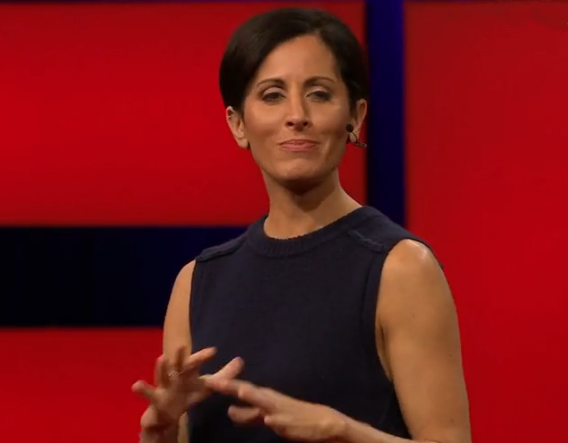How can this be? We think it's because these nuns had a high level of cognitive reserve,
这是怎么回事呢?我们认为这是因为这些修女拥有高级的认知储备,
which is a way of saying that they had more functional synapses.
意味着她们有功能更强的突触。
People who have more years of formal education, who have a high degree of literacy,
接受正式教育的时间越长的人,拥有较强读写能力的人,
who engage regularly in mentally stimulating activities, all have more cognitive reserve.
定期参加刺激心理活动的人,这些人都有更高的认知储备。
They have an abundance and a redundancy in neural connections.
他们有着大量甚至多余的神经连接。
So even if they have a disease like Alzheimer's compromising some of their synapses,
所以即使他们患上老年痴呆等疾病损伤了部分突触,
they've got many extra backup connections, and this buffers them from noticing that anything is amiss.
他们依然有充足的额外后备连接,而这减缓了他们的大脑产生混乱。
Let's imagine a simplified example. Let's say you only know one thing about a subject. Let's say it's about me.
让我们来看一个简单的例子。假设你只知道关于某一主题的一件事。比方说是关于我的。
You know that Lisa Genova wrote "Still Alice," and that's the only thing you know about me.
你知道丽莎·吉诺瓦写下了《依然爱丽丝》,这是你唯一知道的关于我的事。
You have that single neural connection, that one synapse. Now imagine you have Alzheimer's.
你拥有一处单一的神经连接,那一个特定突触。如果现在你患上了老年痴呆。
You have plaques and tangles and inflammation and microglia devouring that synapse.
你有样斑块、神经纤维缠结和炎症,并且小神经胶质细胞吞噬了那一突触。
Now when someone asks you, "Hey, who wrote 'Still Alice?'" you can't remember,
现在若有人问起你,“嘿,谁写了《依然爱丽丝》?”你无法回想起来了,
because that synapse is either failing or gone. You've forgotten me forever.
因为那个突触要么衰弱要么消失了。你把我忘得一干二净。

But what if you had learned more about me? Let's say you learned four things about me.
但是如果你对我了解更深呢?比如你了解我的四件事情。
Now imagine you have Alzheimer's, and three of those synapses are damaged or destroyed.
现在如果你患上了老年痴呆,即使三处突触已损伤或者毁坏。
You still have a way to detour the wreckage. You can still remember my name.
你依然有一条路来绕过阻碍找到我的信息。你依然记得我的名字。
So we can be resilient to the presence of Alzheimer's pathology through the recruitment of yet-undamaged pathways.
所以我们可以通过使用那些未损坏的通路有效应对老年痴呆。
And we create these pathways, this cognitive reserve, by learning new things.
同时我们通过学习新事物,创造了新的通路,改变着认知储备。
Ideally, we want these new things to be as rich in meaning as possible, recruiting sight and sound and associations and emotion.
理想情况下,我们希望这些新事物的意义尽可能丰富,吸纳视觉与听觉的联合感受。
So this really doesn't mean doing crossword puzzles.
所以这并不意味着去做横纵字谜游戏。
You don't want to simply retrieve information you've already learned,
你不希望去重拾那些你早已学会的信息,
because this is like traveling down old, familiar streets, cruising neighborhoods you already know.
这就好比游览老旧的熟悉街道,那些周边环境你早已了然于心。
You want to pave new neural roads. Building an Alzheimer's-resistant brain means learning to speak Italian,
你想要开辟新的神经道路。使你的大脑抵抗老年痴呆,意味着学习说意大利语,
meeting new friends, reading a book, or listening to a great TED Talk.
去遇见新朋友,读一本书,或是听一场精彩的TED演讲。
And if, despite all of this, you are someday diagnosed with Alzheimer's,
如果做了所有的这一切之后,有一天你被诊断为老年痴呆,
there are three lessons I've learned from my grandmother and the dozens of people I've come to know living with this disease.
我从我的祖母以及我认识的许多患者中学习到了三件事情。
Diagnosis doesn't mean you're dying tomorrow. Keep living.
诊断并不意味着死期将至。顽强地活下去吧。
You won't lose your emotional memory. You'll still be able to understand love and joy.
你不会丢失你的情感记忆。你依然可以理解爱与喜悦。
You might not remember what I said five minutes ago, but you'll remember how I made you feel.
你也许不会记得我五分钟前的话语,但是你依然会记得我带给你的感受。
And you are more than what you can remember. Thank you.
你远胜于你所能记住的一切。谢谢。



